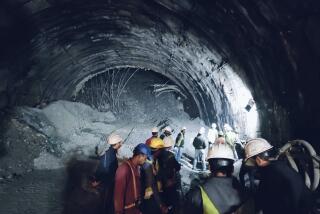Bangladesh crowd gathers as collapse cleanup ends
- Share via
NEW DELHI — Thousands gathered Tuesday in the rubble of the collapsed Rana Plaza garment factory complex in Bangladesh to pray for the 1,127 people who died in the world’s worst apparel industry disaster.
Pictures taken at the Islamic prayer ceremony on the outskirts of Dhaka, the capital, showed a rescue worker in yellow headgear affixing a red flag in the ruins.
Army personnel, who have been working around the clock for almost three weeks, ended their cleanup and recovery operation early Tuesday, handing responsibility to civil authorities.
PHOTOS: Bangladesh building collapse
More than 2,400 people were rescued, including Friday’s miraculous recovery of a seamstress who had spent 17 days in the rubble, but authorities say they still don’t know how many were in the structure when it collapsed.
The military said it believed all bodies had been recovered. Nearly 100 people are listed as missing, however, and about 60 unidentified bodies remain at a morgue. More than 230 corpses, many battered beyond recognition, were buried by a charity group after going unclaimed. The last body was recovered Sunday.
Relatives of those still unaccounted for formed a procession near the site about noon Tuesday, holding photographs of their loved ones and demanding that they, or at least their bodies, be returned immediately.
Maj. Gen. Chowdhury Hasan Suhrawardy, who has overseen the operation at the site, thanked soldiers, firefighters and others involved in the rescue and cleanup work. He said troops had compiled a list of about 1,000 survivors, including apparel workers who suffered amputations, that would be given to the government so they might be given jobs on a priority basis.
Deputy Minister Jahangir Kabir Nanak told reporters that the prime minister would like to see the site converted into a rehabilitation center for victims of the disaster.
The massive building — eight stories plus another under construction, all allegedly built without proper permits and using substandard materials — collapsed April 24 after garment workers reported seeing cracks and hearing creaking sounds.
Many workers in the five garment factories in the building had reportedly been told that there was no problem and were ordered to their sewing machines that morning despite the warnings.
As the global spotlight has intensified on the plight of Bangladesh’s garment workers, many of whom earn the minimum wage of $37 a month, factory owners, foreign brands and the government have come under pressure to reform the nation’s apparel industry, which accounts for 80% of national exports.
On Monday, several Western retailers, including Sweden’s H&M; Britain’s Primark, Tesco and Marks & Spencer; the Netherlands’ C&A; Italy’s Benetton; and Spain’s Inditex, owner of the Zara chain, said they would sign an agreement requiring independent safety inspections at factories making their goods and promising to pay for repairs. They also pledged to stop doing business with any factory that refuses to upgrade its facilities.
One of the major holdouts is Wal-Mart, the second-largest clothing producer in Bangladesh, and Gap, which has said it is close to signing such a pledge but is concerned about potential legal liability.
Labor activists warn, however, that the real test will come months and years from now when attention is focused elsewhere, given the history of corruption, weak implementation and intense cost-cutting in the industry.
Tanvi Sharma in The Times’ New Delhi bureau contributed to this report.
More to Read
Sign up for Essential California
The most important California stories and recommendations in your inbox every morning.
You may occasionally receive promotional content from the Los Angeles Times.










